
The First Cabinet of Napoleon I was appointed by the Emperor Napoleon I upon the establishment of the First French Empire on 18 May 1804, replacing the Cabinet of the Consulate. It was succeeded by the French Provisional Government of 1814 following the downfall of Napoleon and the abolition of the Empire.
The French Provisional Ministry of 1830 was announced on 1 August 1830 by Louis-Philippe d'Orléans in his capacity as Lieutenant General of the kingdom. It replaced the Paris Municipal Commission Ministry announced the day before after the revolution in which the Bourbon Restoration monarchy was deposed. On 11 August 1830 it was replaced by the First ministry of Louis-Philippe.

The First cabinet of Adolphe Thiers was announced on 22 February 1836 by King Louis Philippe I. It replaced the Cabinet of Victor de Broglie.
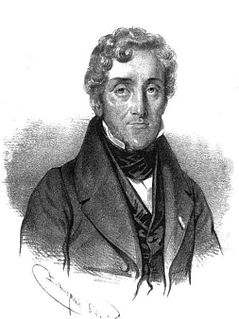
The Second cabinet of Louis Mathieu Molé was announced on 15 April 1837 by King Louis Philippe I. It replaced the First cabinet of Louis Mathieu Molé.
The Transitional French cabinet of 1839 was announced on 31 March 1839 by King Louis Philippe I. It replaced the Second cabinet of Louis Mathieu Molé.
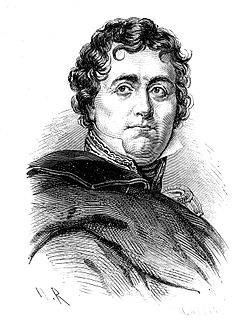
The Second cabinet of Nicolas Jean-de-Dieu Soult was announced on 12 May 1839 by King Louis Philippe I. It replaced the Transitional French cabinet of 1839.

The Second cabinet of Adolphe Thiers was announced on 1 March 1840 by King Louis Philippe I. It replaced the Second cabinet of Nicolas Jean-de-Dieu Soult.

The Third cabinet of Nicolas Jean-de-Dieu Soult was announced on October 29, 1840 by King Louis Philippe I. It replaced the Second cabinet of Adolphe Thiers.

The Ministry of Casimir de Rochechouart de Mortemart was announced on 29 July 1830 by King Charles X of France during the last day of the Bourbon Restoration. Later that day the ministry was replaced by the Paris Municipal Commission.

The Ministry of Jules de Polignac was formed on 8 August 1829 in the last year of the reign of King Charles X of France. It was dissolved on 29 July 1830 during the July Revolution and replaced by the Ministry of Casimir de Rochechouart de Mortemart.

The Ministry of Jean-Joseph Dessolles was formed on 29 December 1818 after the dismissal of the First ministry of Armand-Emmanuel du Plessis de Richelieu by King Louis XVIII of France. It was dissolved on 19 November 1819 and replaced by the Ministry of Élie Decazes.

The Ministry of Élie Decazes was formed on 19 November 1819 after the dismissal of the Ministry of Jean-Joseph Dessolles by King Louis XVIII of France. It was dissolved on 17 February 1820 and replaced on 20 February 1820 by the Second ministry of Armand-Emmanuel du Plessis de Richelieu.

The Ministry of Joseph de Villèle was formed on 14 December 1821 after the dismissal of the Second ministry of Armand-Emmanuel du Plessis de Richelieu by King Louis XVIII of France.
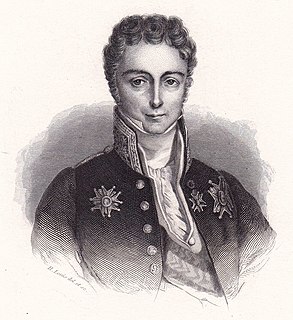
The Ministry of Jean-Baptiste de Martignac was formed on 4 January 1828 after the dismissal of the Ministry of Joseph de Villèle by King Charles X of France. The ministry was replaced on 8 August 1829 by the Ministry of Jules de Polignac.
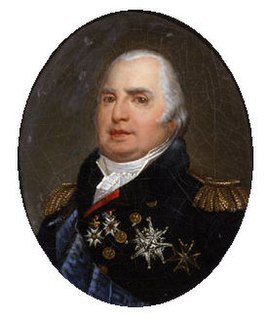
The Government of the first Bourbon restoration replaced the French provisional government of 1814 that had been formed after the fall of Napoleon. It was announced on 13 May 1814 by King Louis XVIII of France. After the return of Napoleon from exile, the court fled to Ghent and the government was replaced by the French Government of the Hundred Days on 20 March 1815.

The French Provisional Government of 1814 held office during the transitional period between the defeat of Napoleon followed by the surrender of Paris on 31 March 1814 and the appointment on 13 May 1814 of the Government of the first Bourbon restoration by King Louis XVIII of France.

The French Government of the Hundred Days was formed by Napoleon I upon his resumption of the Imperial throne on 20 March 1815, replacing the government of the first Bourbon restoration which had been formed by King Louis XVIII the previous year. Following the defeat of Napoleon at the Battle of Waterloo and his second abdication on 22 June 1815 the Executive Commission of 1815 was formed as a new government, declaring the Empire abolished for a second time on 26 June.
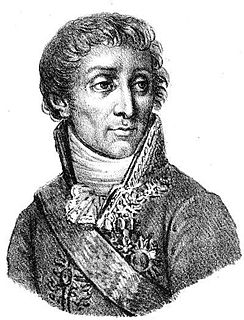
The French Provisional Government or French Executive Commission of 1815 replaced the French government of the Hundred Days that had been formed by Napoleon after his return from exile on Elba. It was formed on 22 June 1815 after the abdication of Napoleon following his defeat at the Battle of Waterloo.
The Commissioners of the Committee of Public Safety were appointed by the French Committee of Public Safety to oversee the various administrative departments between 1 April 1794 and 1 November 1795.
Louis Grégoire Deschamps Destournelles was a French politician who was Minister of Finance during the French Revolution. He was imprisoned during the Reign of Terror, and died soon after being released.














